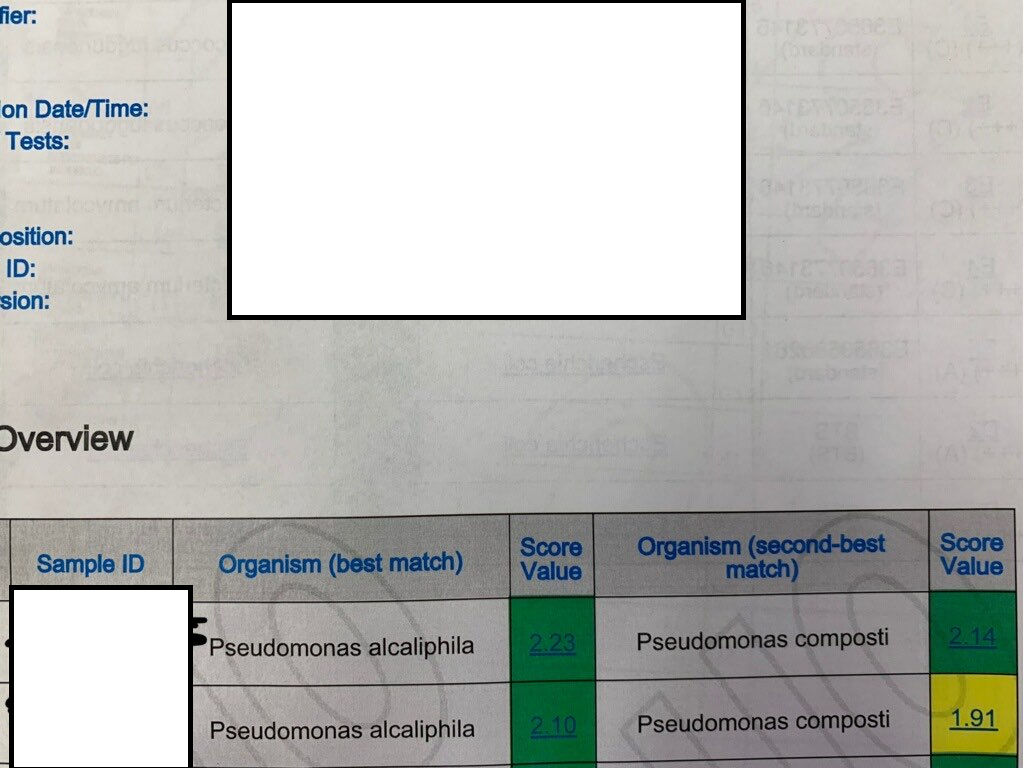The Most Correct Move
The Bruker MALDI-TOF instrument is one of the most used tools at work. It provides rapid and mostly accurate identification of microorganisms. However, it does have its limitations. One of my colleagues came to me about a situation she encountered while running the instrument.

The MALDI-TOF usually gives you the two best matches for organism ID. Most of the time, they are the same organisms. Sometimes, the second option is broader as it gives you a group. For example, an Enterobacter cloacae complex could be in that second option with a member of that group in the first.
What you see in the image above is a rare scenario where the instrument gives you two different organisms with high confidence. As you can see, my colleague ran the patient sample in duplicates.
A quick search on the internet yielded unuseful results for P. alcaliphila and P. composti. The former is a psychrophile and the other is something you'd find in a compost. Given the patient sample came from a leg wound, there was nothing to distinguish the two without more molecular or biochemical testing.
While the colleague was preoccupied with what to do, I thought she was missing the forest for the trees. In other words, she was focusing on the wrong details.
If you have read this far, you probably think this is a problem for reporting patient results. First, not knowing the organism's exact species doesn't stop us from performing susceptibility testing. Second, the two Pseudomonas species mentioned are not common pathogens.
The most logical way to report on this patient is the "cop-out" answer: Pseudomonas species, not aeruginosa.
If the clinicians want to know more, they could order more specific molecular or biochemical tests. For the treatment of the patient, it's largely irrelevant. As for us, we would attach the MALDI results in the composed text section and the workup log. If researchers want the organism for in-house research later, they would have the information in the database.
My less-experienced coworker learned something that night. As laboratory personnel, we are there to provide data. The clinicians are the ones that would have to put together the puzzles to what's ailing the patients. Sometimes, some details are not worth our time to hammer out. The ones that don't are those that don't affect patient treatments.
Posted with STEMGeeks
View or trade
BEER.Hey @enforcer48, here is a little bit of
BEERfrom @pixresteemer for you. Enjoy it!Learn how to earn FREE BEER each day by staking your
BEER.That is true , you did well , thanks for sharing
https://cdn.discordapp.com/emojis/1107977495883558912.webp?size=96&quality=lossless
'Provide data' . You must have a lot of self control to be able to detach yourself and get on with the job. I'd be completely distracted and end up letting my work pile up as I chased answers!
What symptoms and problems did this actually cause the patient?
Pseudomonas composti....I'm going to be extra careful in the garden today!
Have a great week and best wishes to your family :-)
Most of the times, we don't have access to that info. I guess I have the clearance to dig it up, but it's largely irrelevant and unrelated to what I do.
When interesting things pop up, they do pique my interest still.
You take care as well.
Awesome I really appreciate you sharing.
Glad you enjoy it.
You did your job! I hope the clinicians are able to come to a conclusion on which of the two pseudomonas species is actually on the wound. It is possible that one antibiotic or antiseptic could be used to treat both.
Unlike P. aeruginosa, these 2 aren't that resistant in comparison.
Thanks for sharing, I hope the move you took would be correct.
Quite a lazy medical job if there's ever been one😂😂😂
What do you mean?
Well the fact that you don't have to puzzle yourself over the cause of the wider range of organisms on the wound....
At least from this scenario 😂😂
Literally not what happened as we still perform antibiotic testing.
Most Pseudomonas are not as resistant as P. aeruginosa. The other pathogenic ones are in the fluorescens and stutzeri group, but not as common.
Perhaps don't assume things?
Perhaps...
This post is very useful and helpful. Thanks for sharing.
i feel that i learned something new today
Thanks for your contribution to the STEMsocial community. Feel free to join us on discord to get to know the rest of us!
Please consider delegating to the @stemsocial account (85% of the curation rewards are returned).
You may also include @stemsocial as a beneficiary of the rewards of this post to get a stronger support.